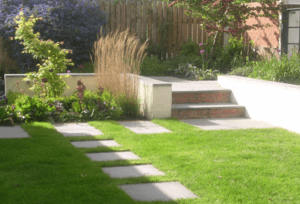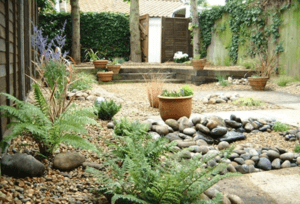Environmental-friendliness has always been a prominent feature for garden designers, but it has become increasingly more important to the customer as well as to the designer in recent years. More and more often we’re being asked what the best materials and methods are to ensure an eco-friendly end result. Ranging from the choice of wood for decking to the types of planting to encourage insect life – it’s a vast subject and one that we take a keen interest in. So we’re glad to see it becoming a more frequent conversation and wanted to share some things that you can do at home to make sure that your outdoor space is as eco-friendly as it can be.
Using recycled materials
You’ve heard the term upcycling and you’ve heard the term vertical gardening – why not combine them both? One chance for you to use otherwise discardable materials is to find somebody giving away wooden pallets, they’re all over the internet as free to collector and they make great planters when mounted on an outside wall. All you need to do is put some landscape fabric on the back and add some kind of mesh or chicken wire. Your plants will be able to root onto the mesh and will be out of reach of a lot of pets and pests – not to mention will look great and save you money.
On the same theme, you can use lots of ‘rubbish’ as options for planting. Barrels, wheelbarrows, watering cans, tires and more…
Choosing the right plants
A lot of people believe that to be ecologically-friendly, you either have to sacrifice style or sterling. It can sometimes be more expensive and it can sometimes limit your choice of materials, but one of the simplest things that you can do is choose native, climate-appropriate plants. It might sound obvious and not particularly eco-friendly, but it limits your interaction with the plants and therefore reduces water usage, chemical usage and man hours. Finding those that can tolerate the micro-climate of your garden (for example those that are resistant to drought or flooding, that can withstand high winds or dry air) can mean less maintenance as well as less artifical assistance.
Permeable paving
Paving in itself can be an ecological answer, avoiding lawns and extensive planting beds that require lots of watering and the odd dose of supplements. But permeable paving adds another element to your eco feel-good factor. Using a porous type of stone or material allows you to manage storm-water to avoid flooding, prevent run-off and replenish your local groundwater. The groundwater that you replenish will spread much further than the footprint of your patio, meaning that it will benefit any lawn or flower beds that you have nearby and reduce the need for artificial irrigation.
In the US, the government have begun trialling ‘sustainable landscaping rebates’ where the responsible homeowner gets financial reimbursement for being eco-friendly. Who knows when the idea might catch on here…
Eden Restored is a team of passionate garden designers working throughout London, Kent and Surrey.
We deliver value-for-money on projects of any size, from inner-city courtyards to countryside cottages.
To discuss your ideas and how we can help throughout the entire process, get in touch.


